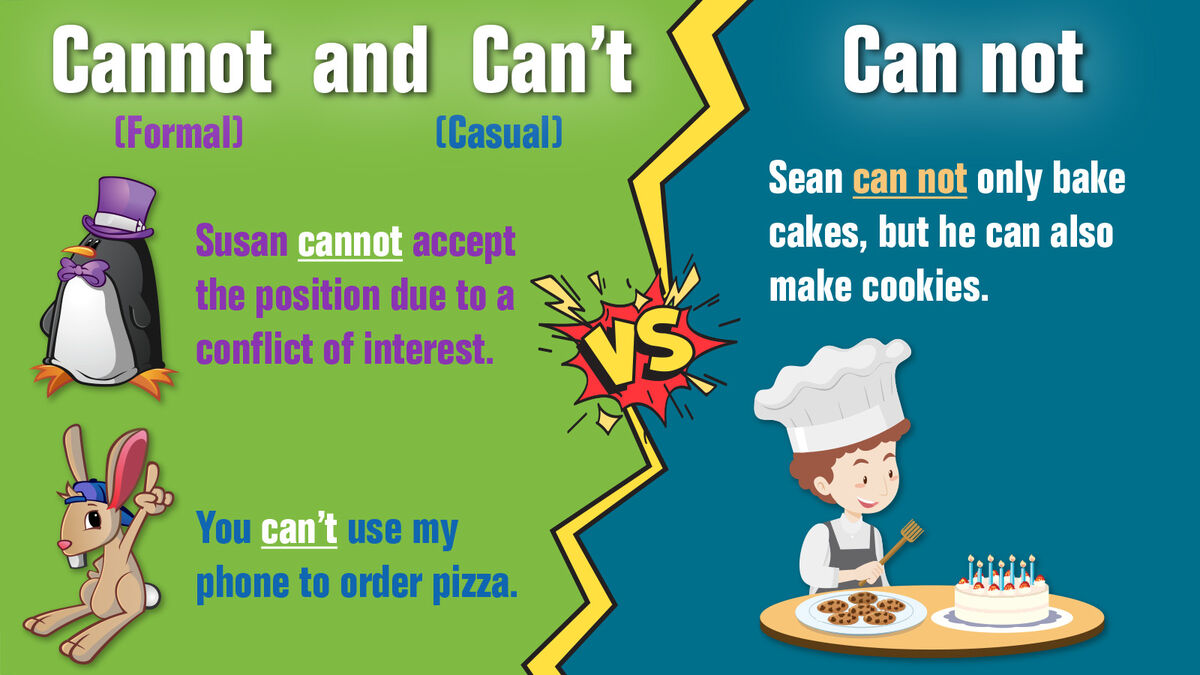
Is cannot one word or two words? The answer is one word – most of the time. Cannot and can’t have the same meaning, but can not appears differently in a sentence. Read on to find examples of situations in which cannot or can’t would be acceptable, and when can not might cross your path.
Cannot and Can’t
Both cannot and can’t mean that a person or object does not have the ability to do something. They can also mean that someone does not have permission when can takes the place of may. However, you wouldn’t necessarily use them in the same contexts.
When to Use Cannot
You’ll find cannot in formal writing and speech. Research studies, academic reports, and professional presentations are places where cannot is the most appropriate choice. Some formal sentences with cannot include:
- Our study cannot prove a correlation between the event’s cause and effect.
- I regret to inform you that we cannot publish your work at this time.
- Susan cannot accept the position due to a conflict of interest.
- Our department cannot afford another layoff.
You can also find cannot when someone wants to emphasize a point. In these cases, there is a strong emphasis on not. For example:
- I cannot believe Luisa dumped you!
- No, you cannot borrow the car after failing math.
- Our team cannot wait for the results of the market study.
- We cannot allow this behavior to continue.
Some people may think that the emphasis on not means that they should use can not (as two words). While can not is an acceptable alternate spelling, cannot is generally preferred by most writers.
When to Use Can’t
Can’t is the contracted version of cannot. It’s most appropriate in casual speaking and informal writing where cannot sounds too stiff. Check out these examples of sentences that use can’t.
- You can’t use my phone to order pizza.
- Joey can’t come into my room unless he asks first.
- I can’t turn right onto a one-way street.
- My parents can’t understand what it’s like to be a teenager.
Even though can’t is more informal than cannot, it’s still allowed in formal writing styles such as MLA. Using cannot throughout a piece of writing or speech may make your writing sound stilted. Can’t sounds more conversational and approachable.
Can Not
A reader is more likely to see can not as two parts of separate phrases. The helping verb can sometimes precedes a phrase that begins with not, such as the correlative conjunction not only. This is usually paired with a but also in the second half of the sentence. Here some sentences with can not used in this way.
- We can not only build the house, we can also sell it for a profit.
- Sean can not only bake cakes, but he can also make cookies.
- I can not only perform the balance beam, but I can perform a parallel bars routine as well.
You may also see can not when a speaker has the ability not to do something. In these cases, can links to the negative form of an active verb.
- If she wants to avoid conflict, Gemma can not address the scandal in her speech tonight.
- We can not make an offer if we want to pass on the house.
- Maybe I can not worry about this for a few days.
In question form, the noun or pronoun comes between can and not. For example:
- Can we not discuss this today?
- Can Stacy not be late for once?
- Can my family not fight for one day?
Each of these sentences has a distinctly different meaning than if they had used cannot or can’t. These uses of can not are not as common, but they do need to retain their two-word status to keep the sentence’s intended meaning.
Can’t Not
It looks incorrect, but sometimes can’t not is the most appropriate way to say what you mean. Like can not, can’t not consists of two phrases coming up against each other. For example:
- I can’t not talk to you on your birthday.
- Eduardo can’t not perform when he sees a stage.
- We can’t not say something to the teacher.
While technically correct, all of these can not and can’t not instances would benefit from some rewording. Avoiding the appearance of a double negative is worth the effort. Be sure that you are using the appropriate syntax to say what you want to say.
More Confusing Grammar
If there are other words that seem like they should mean the same thing, learn how to tell the difference. An article on your vs. you’re is helpful for separating adverbs and contractions. You can also read when it’s appropriate to use use to instead of used to. (It’s less obvious than you think!) From there, explore the difference between maybe and may be.